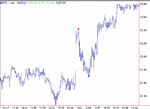mm.. 'trading for a living..', conjures up all sorts of lovely thoughts/emotions. And you know the game of trading, it is a beautiful game. They reckon Chess is the ultimate mind game... they have no idea!
Trading challenges us in so many different ways.. more often than not highlighting our shortcomings, our lack of discipline, our propensity toward greed, fear and panic. At the end of a trading day we feel that we know ourselves that little bit more than we did from the day before.
But all that aside, how many of us have mastered the game to a level which enables us to extract enough profit to actually earn a living from it??
I posted a thread not so long ago, "fifty percenters" and interestingly got no response. So rather than have traders hang their hat on their trading record, would anyone out there care to comment on the profit levels that they think must be maintained to secure a living from trading.
Regards
Kevyn T
Trading challenges us in so many different ways.. more often than not highlighting our shortcomings, our lack of discipline, our propensity toward greed, fear and panic. At the end of a trading day we feel that we know ourselves that little bit more than we did from the day before.
But all that aside, how many of us have mastered the game to a level which enables us to extract enough profit to actually earn a living from it??
I posted a thread not so long ago, "fifty percenters" and interestingly got no response. So rather than have traders hang their hat on their trading record, would anyone out there care to comment on the profit levels that they think must be maintained to secure a living from trading.
Regards
Kevyn T

